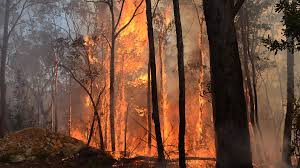In the searing Max Frisch morality play Biedermann und die Brandstifter (The Fire Raisers) the hapless Mr Biedermann invites three people into his home ignoring the obvious reality that they are arsonists. He continues to turn a blind eye as they wreak havoc through his community.
Written in 1958, the play is seen an allegory for Europe’s contrived ignorance towards the rise of totalitarianism. Today, it could be seen as a parable for our wilful blindness towards climate change.
The September and October fires that have ripped through New South Wales are another eerie reminder of the threats that climate change could render on our comfortable existence. There is no evidence that climate change directly caused the bushfires, climate change did contribute to the conditions that exacerbated the risk of the bushfires, and climate change will increasingly create the conditions in which bushfires can flourish.
As the Sydney Morning Herald has noted, Sydney had its mildest winter and hottest year to date temperature in 150 years. It had 28 days in a row without rain. These conditions, consistent with broad climate change projections, together with low humidity and strong, swirling winds, provided the context for an early start to the fire season. This followed Sydney’s horrendous, sweltering summer – what the Climate Commission called The Angry Summer – and the broader trend of a 0.7ºC increase in global average temperatures over the past century.
So if Climate change did not light the bushfires – it may in fact have been the actions of arsonists or litterers or hazard reduction gone awry – it did help create the conditions that allowed them to flourish. People throw cigarettes out of their car windows every day without fires starting, but if someone is idiotic enough to do it on a high fire danger day, the chances of a fire starting are so much greater. Climate change doesn’t light bushfires but they are more likely to cause damage with hotter temperatures and drier climates.
Despite our angry summer, warm winter and balmy spring, many commentators still refuse to acknowledge climate change may be playing a part in the furious fire season confronting us. On Sky News recently, one commentator lambasted a panellist for daring to mention climate change in discussing the fires. Whilst the host accepted humans were contributing to rising temperatures, he refused to link climate change to the breaking news story being covered by that same television station. He wasn’t alone in dismissing the blindingly obvious.
Whether it was the Angry Summer, previous megafires that ripped through Victoria and the ACT, the intensity of Cyclone Yasi or the extreme floods that devastated Queensland in 2010 and 2011, after every natural disaster commentators and some politicians refuse to acknowledge that climate change might be playing a role. There must be a limit to the wilful blindness.
A recent Washington Post editorial highlighted a major National Oceanic and Atmospheric Administration (NOAA) report on climate change and extreme weather, noting “the picture they offer is of a planet in which warming has boosted the chances, in some cases significantly, that certain unwelcome weather or weather-related disasters will occur”.
The NOAA paper seems to be consistent with the forthcoming report of the Intergovernmental Panel on Climate Change. According to leaks of the reports that have appeared in Fairfax papers, the IPCC will conclude there is a more than 95% likelihood that human activity is the primary cause of warming since the 1950s, and that ongoing human activity, including the burning of fossil fuels, could lead to a 5 degree increase in global temperatures this century.
Writing in The New York Times, Justin Gillis suggested the IPCC “seems to be bending over backward to be scientifically conservative”, highlighting uncertainty and emphasizing the least harmful projections, notwithstanding the tremendous risks of the worst-case scenarios. Regardless of this scientific conservatism, Justin Gillis acknowledges the “lowball numbers” are worrisome enough, the high estimates even scarier.
The release of the IPCC report in late September was another clarion call for action on climate change, even if its release didn’t coincide with the perfect storm that welcomed the release of the last IPCC report in 2007, best demonstrated by the enormous public interest in Al Gore’s Academy Award-winning documentary An Inconvenient Truth.
Whilst some in politics and the community refuse to accept the science of climate change, it doesn’t mean climate change will go away. Just because climate change wasn’t a top three issue in the election campaign, it doesn’t mean climate change won’t be one of the top three issues facing the new government.
Too often, political commentators treat climate change as a political issue. They see it as a political debate over the carbon price, and ignore the underlying issue – the national interest in taking action on climate change.
Too often, politicians fall into the trap of seeing climate change as just a political issue, seeking advantage in the day-to-day politics – a play without morality. The debate must be about the best way to deliver climate action.
Some may wish to turn a blind eye to climate change, but that will not stop climate change. Political positioning over the so-called carbon tax will not stop the need for action on climate change. That will be the lesson for the incoming government and all future governments.
Wayne Smith is the Director of Clean Economy Services, a renewable energy consulting firm. His clients include solar and renewable energy companies and industry associations. This article reflects his views only.










